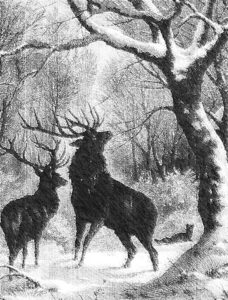Communities Urge Gov. Hochul
To Sign S6510/A07785 into Law
Multiple User Groups Want Outdoor
Access Free of Holiday Deer Hunt

By JOHN RYBINSKI
New York State communities are seeking action from Governor Kathy Hochul to allow them to opt-out of the newly adopted Holiday Deer Hunt, in order to ensure safe outdoor access to multiple user groups during the Christmas holiday break.
The state legislature acted by passing Senate Bill S6510 and Assembly Bill A07785, giving counties the ability to prohibit hunting during a seven-day special late bow, special long bow and muzzle loader season in the state’s Southern Zone. S6510/A07785 allows each county to decide whether to participate in the new deer hunting season—from December 26 through January 1, opened for the first time in 2021—in order to maximize outdoor recreational access for New Yorkers during this time.
While deer season is open, other user groups avoid disturbing hunters and the deer for both tradition and safety’s sake.
“Snowmobile trails are closed till the deer season ends,” explained Michael Anderson, member of the New York State Snowmobile Association.
Many landowners also shut down access to foresters, forestry work and other types of outdoor activities during deer hunting season.
The Holiday Deer Hunt was not requested by hunters, sportsmen or any deer hunting group—a common lament is that New York’s firearms season was already too long and, according to holiday hunt opponents, New York State without the holiday hunt would still provide more days afield for deer hunting with firearms than most all other northern states.
“There are myriad reasons not to allow deer hunting that late in the season when deer are extremely vulnerable,” stated George Allen, Central New York National Deer Association president.
Allowing counties to choose Department of Environmental Conservation programs is nothing new, the latest example being the 12-year-old youth hunt legislation. Especially across the southern part of the state, hunting regulations are not “one-size-fits-all.” Many exceptions occur.
The holiday hunt was enacted in the Southern Zone; the Northern Zone was not forced to accept a new hunting season. Fourteen counties in whole or in part do not have the holiday hunt season; therefore, allowing more counties the ability to choose shouldn’t be an issue. This bill allows communities to adjust their participation in the future as they deem appropriate for their area.
The Holiday Deer Hunt may have significant negative economic impacts on rural communities and businesses. Many businesses depend on the revenue generated by activities such as hiking, cross-country skiing, snowmobiling and farm-to-table operations. Rural communities depend on this income to be able to survive during the winter months.
Furthermore, the holiday hunt is not necessary for deer control, as the DEC has stated it “doesn’t need the additional time to manage the deer populations.”
New York State already has one of the longest firearm deer hunting seasons without adding the holiday hunt—rural landowners, hunters and non-hunters alike have welcomed the close of the season so they can pursue other interests. This is especially true of the Christmas holiday break, when families have an opportunity to enjoy the outdoors together.
“Many hunters who love to hunt are relieved when deer season ends,” stated Tom Cole, who said he looks forward to working on his property maintenance to-do list before Christmas, heavy snows and colder weather.
Governor Hochul has a unique opportunity to exercise her leadership skills to help rural communities in our state. Adoption of S6510/A07785 is a clear, common-sense decision that would allow counties the ability to choose what’s best for them at a local level on this issue. At the same time, it would help fulfill a past promise from the commissioner of the DEC to allow an opt-out at the county level.
John Rybinski is the director of NYR’s Against Longer Deer Season, whose members include big-game hunters, foresters, landowners, snowmobilers, equestrians, dog walkers, trappers, farmers, houndsmen and small-game hunters.

